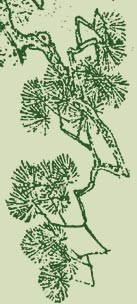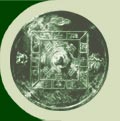

Q: What is acupuncture and Chinese medicine?
A: Chinese medicine treats the whole patient in a natural, harmonious way. It is one of the world's oldest systems of medicine and dates back some 5,000 years. Acupuncture and Chinese herbal medicine are the two primary methods of treatment employed in the practice of Chinese medicine, although many practitioners also make diet, exercise and lifestyle recommendations.
Good health is maintained through a balance of a person's vital energy called qi (pronounced "chee"). Any illness or symptom of the body, mind or spirit is associated with a disharmony in qi. As Chinese medicine restores harmony, symptoms recede and the sense of health and well being is restored. As treatment progresses, improvements are frequently noticed on many levels. Each person is treated as an individual with a unique approach.
Q: Who sees acupuncturists?
A: People of all ages come for acupuncture treatment. Some may be referred by their physicians and seek relief of particular symptoms. Others use acupuncture or Chinese herbal medicine for their ability to support overall health. Acupuncture is often helpful when other forms of treatment have been inadequate or unsatisfactory. For persistent health problems or for a treatment style that naturally enhances the body's own healing potential, acupuncture and herbal medicine may be the treatment of choice.
Q: How long is the visit?
A: The first visit is the longest in order to allow for a complete history taking and exam - typically 90 minutes. Follow-up visits are shorter, usually 60 minutes, depending on patient needs. Sometimes other therapies, such as moxibustion, cupping, acupressure or shiatsu are incorporated with the acupuncture treatment.
Q: What is moxibustion?
A: Moxibustion is an herb called Mugwort. Your acupuncturist may burn the herb on the handle of the needle, above your skin, on salt, or a slice of ginger. This will warm the acupuncture points or certain areas and quicken your healing process.
Q: What is cupping?
A: Cupping is a therapy that stimulates the flow of blood and qi to the superficial muscle layers. It is used to break up blockages of qi, for sore muscles, tension, neck pain, and the common cold. In this therapy, your acupuncturist will place small glass "cups" over specific areas on your body. A vacuum is created under the cup using heat or suction. Sometimes your acupuncturist may slide the cups over certain areas, or just leave them still. You may leave the office looking as though a large octopus gave you a big hug. But don't worry; the slight redness will dissipate quickly.
Q: What are the requirements to be a licensed acupuncturist in Washington State?
A: The State of Washington has designated acupuncturists as health professionals under the title "licensed acupuncturist" (L.Ac.) The profession of acupuncture is regulated by the Department of Health. Medical Doctors (MD's), Doctors of Osteopathy (D.O.'s), and Physician Assistants (PA's) may also practice acupuncture as part of their scope of practice with brief acupuncture education (typically 200 hours). They are not designated licensed acupuncturists (L.Ac.'s) unless they have similarly undergone the training and certification as outlined below.
Education Requirements
Acupuncturists must graduate from a school that is accredited by either the United States government or by the National Accreditation Commission for Schools and Colleges of Acupuncture and Oriental Medicine (NACSCAOM). An acupuncturist's education must include at least 450 hours of training in western sciences: anatomy, physiology, microbiology, biochemistry, pathology, western clinical sciences, hygiene, and cardio-pulmonary resuscitation. Acupuncturists must complete a minimum of 750 hours of acupuncture study, including fundamental principles, diagnosis, pathology, therapeutics, meridians & points, and acupuncture technique including electroacupuncture. Clinical training must include a minimum of 100 hours of clinical observation and 290 hours of supervised practice. Acupuncturists must have applied over 400 treatments on at least 100 patients over the course of more than one year of their schooling. Acupuncturists must all demonstrate fluency in the English language as well. The major schools of acupuncture in Washington State are built around a three-year program, which requires extensive prerequisites.
Acupuncturists must graduate from a school that is accredited by either the United States government or by the National Accreditation Commission for Schools and Colleges of Acupuncture and Oriental Medicine (NACSCAOM). An acupuncturist's education must include at least 450 hours of training in western sciences: anatomy, physiology, microbiology, biochemistry, pathology, western clinical sciences, hygiene, and cardio-pulmonary resuscitation. Acupuncturists must complete a minimum of 750 hours of acupuncture study, including fundamental principles, diagnosis, pathology, therapeutics, meridians & points, and acupuncture technique including electroacupuncture. Clinical training must include a minimum of 100 hours of clinical observation and 290 hours of supervised practice. Acupuncturists must have applied over 400 treatments on at least 100 patients over the course of more than one year of their schooling. Acupuncturists must all demonstrate fluency in the English language as well. The major schools of acupuncture in Washington State are built around a three-year program, which requires extensive prerequisites.
Certification Requirements
The State of Washington currently requires that all acupuncturists have taken and passed the National Commission for the Certification of Acupuncture and Oriental Medicine (NCCAOM) board examination. This examination is used by nearly all of the states regulating the profession of acupuncture. To ensure proper needling hygiene, Washington State also requires that all acupuncturists receive Clean Needle Technique certification as approved by the NCCAOM.
The State of Washington currently requires that all acupuncturists have taken and passed the National Commission for the Certification of Acupuncture and Oriental Medicine (NCCAOM) board examination. This examination is used by nearly all of the states regulating the profession of acupuncture. To ensure proper needling hygiene, Washington State also requires that all acupuncturists receive Clean Needle Technique certification as approved by the NCCAOM.
Licenses
Acupuncture licenses are regulated by the Department of Health. Acupuncturists must complete 16 hours of continuing education per year to maintain their licenses. Questions, complaints, etc. regarding acupuncturists should be directed to the Department of Health.
Acupuncture licenses are regulated by the Department of Health. Acupuncturists must complete 16 hours of continuing education per year to maintain their licenses. Questions, complaints, etc. regarding acupuncturists should be directed to the Department of Health.
Chinese Herbal Medicine
The practice of Chinese herbal medicine currently falls into the scope of practice of licensed acupuncturists. The NCCAOM also certifies acupuncturists in Chinese herbal medicine after completion of a board examination. If you have questions about training, please ask your acupuncturist about his/her level of training and if he/she holds any certification in herbal medicine. The profession is currently working with the state government to set specific standards for the practice of Chinese herbal medicine.
The practice of Chinese herbal medicine currently falls into the scope of practice of licensed acupuncturists. The NCCAOM also certifies acupuncturists in Chinese herbal medicine after completion of a board examination. If you have questions about training, please ask your acupuncturist about his/her level of training and if he/she holds any certification in herbal medicine. The profession is currently working with the state government to set specific standards for the practice of Chinese herbal medicine.
Q: Does insurance cover acupuncture?
A: Many insurance companies are required by law to provide full coverage for acupuncture. To avoid any surprises, please contact your insurance company to verify your acupuncture coverage and benefits. As a courtesy to my patients, I bill insurance companies for treatments. Auto insurance also covers acupuncture. If you were injured in a car accident and have personal injury protection (PIP), I can bill the auto insurance company for you.
I currently accept the major insurance plans below:
- Aetna
- Cigna
- American Wholehealth Networks
- First Choice
- Premera
- Premera Blue Cross
- LifeWise
- Uniform Medical Plan
- Personal Injury Cases
- Motor Vehicle Accident Cases
